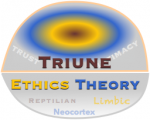
Trust and the Triune Ethics Theory reviews Darcia Narvaez’s breakthrough Triune Ethics Theory paper and draws new insights into how trust and relationship building work, based on the human brain’s evolutionary development, structure, and functions. And it sheds light on how experiential social media increases intimacy.
Triune Ethics Theory, Darcia Narvaez, Ph.D.
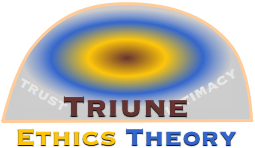 Triune Ethics is an enthralling, exceedingly useful approach to understanding human behavior because it explains the context of trust and relationship building at a profound level that is actionable for anyone who wants deeper, richer, more flexible connections and collaboration with people. Triune Ethics Theory will help me to educate my clients and teams at a deep level, and it can give you a rare understanding of your own behavior—and that of people around you. Triune Ethics is an enthralling, exceedingly useful approach to understanding human behavior because it explains the context of trust and relationship building at a profound level that is actionable for anyone who wants deeper, richer, more flexible connections and collaboration with people. Triune Ethics Theory will help me to educate my clients and teams at a deep level, and it can give you a rare understanding of your own behavior—and that of people around you.
As with all my reviews, I will attempt to summarize this paper’s salient points before adding some reflections and conclusions about how I’m using its assertions in my work. As I have no formal training in neuroscience, I am drawing on lay study as well as psychology and my […]
 The Potential of Female Leadership explores what lessons we may learn from bonobos’ matriarchal social structure, so we can build stronger, more collaborative human communities and groups. Bonobo Handshake is an enthralling insightful book, which I review here. A tremendous bonus is its similarities to and significant differences from Chimpanzee Politics (reviewed yesterday). The Potential of Female Leadership explores what lessons we may learn from bonobos’ matriarchal social structure, so we can build stronger, more collaborative human communities and groups. Bonobo Handshake is an enthralling insightful book, which I review here. A tremendous bonus is its similarities to and significant differences from Chimpanzee Politics (reviewed yesterday).
Bonobo Handshake was on the same library shelf as Chimpanzee Politics, but it is a very different book, and in delightful ways. At the same time, it offers intriguing insight into bonobos’ behavior, which differs significantly from chimpanzees’ and holds interesting lessons for human societies and groups. Although Woods is not a primatologist per se, she has conducted extensive research with her husband, who is, so explaining scientific experiments forms a key part of this book.
Bonobo Handshake is rare in a surprising way. Deftly and subtly, it contrasts the joy, harmony and matriarchal structure of the bonobos with chimpanzees’ and humans’ patriarchal societies and violence: the wars in and around the two Congos result in the […]
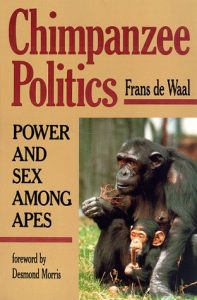 Unique, Insightful and Useful Guide to Business and Civil Politics reveals human political strategies through the eyes of a primatologist studying a chimpanzee community. It lays bare most of the behavior people use “to get ahead” in business and politics by explaining the evolutionary underpinnings of these behaviors, so we can appreciate them at a new level. Unique, Insightful and Useful Guide to Business and Civil Politics reveals human political strategies through the eyes of a primatologist studying a chimpanzee community. It lays bare most of the behavior people use “to get ahead” in business and politics by explaining the evolutionary underpinnings of these behaviors, so we can appreciate them at a new level.
Have you ever heard someone say, “I’m not political!”? S/He may mean well, but this book shows that one cannot be human without being “political”; moreover, it explains political behavior in hilarious, poignant ways that help the reader in multiple ways as I detail here. It is immensely entertaining to read while being scientific in its assertions.
[…]
How Free Things Are Disrupting Businesses + Radical Innovation + Guide to Free Business Models
Book Review: Free/Chris Anderson
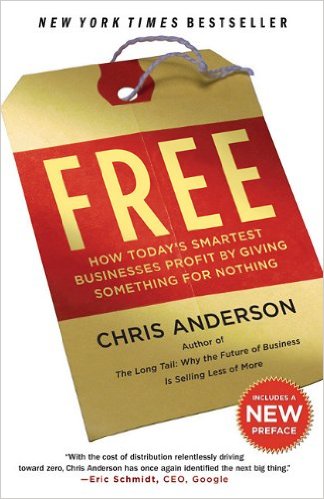 Free is an indispensable introduction to the disruption of “a product for a price,” one of the Industrial Economy’s key constructs. It is rich with examples of many of the pricing innovations and business models with which you’re probably familiar but haven’t thought about in depth. Many of its examples have to do with digital products, which are inherently disruptive because their distribution cost is close to zero, and they can displace legacy analog products. Free is an indispensable introduction to the disruption of “a product for a price,” one of the Industrial Economy’s key constructs. It is rich with examples of many of the pricing innovations and business models with which you’re probably familiar but haven’t thought about in depth. Many of its examples have to do with digital products, which are inherently disruptive because their distribution cost is close to zero, and they can displace legacy analog products.
Free is important and useful for two reasons beyond pricing and business model innovation: it contains a good dollop of behavioral economics with regard to pricing, and it gives numerous examples for thinking beyond the two-party market model that dominated the Industrial Economy, buyer and seller. As Anderson repeatedly shows, in digitally networked markets spawned by the Internet, firms put themselves at significant risk when they don’t adopt a networked ecosystem mindset. For example:
When something becomes free, […]
10 Detailed Case Studies + Big Data & Analytics’ New Digital Divide + How to Think Like a Data Scientist Book Review: Numbers Rule Your World/Kaiser Fung
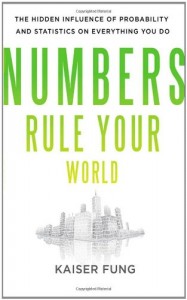 [UPDATED] Step inside a data scientist’s mind, and learn why probability is the key to profit and how it’s the key to understanding and using big data for better decision making. This fascinating and useful book clearly shows how people misunderstand probability and misuse statistics—and therefore big data—and how the knowledge gap leads to faulty models, thinking and decisions. New winners and losers are emerging in the digital social and big-data age. A new digital divide, people who think like data scientists and use probability to support decision making—and everyone else. The data science group will outperform, and Fung shows how creative, fun and useful data science is. [UPDATED] Step inside a data scientist’s mind, and learn why probability is the key to profit and how it’s the key to understanding and using big data for better decision making. This fascinating and useful book clearly shows how people misunderstand probability and misuse statistics—and therefore big data—and how the knowledge gap leads to faulty models, thinking and decisions. New winners and losers are emerging in the digital social and big-data age. A new digital divide, people who think like data scientists and use probability to support decision making—and everyone else. The data science group will outperform, and Fung shows how creative, fun and useful data science is.
This book is a perfect twin to Duncan Watts’ Everything Is Obvious* Once You Know the Answer, which exposes how common sense pervades management decisions and failure. I shall refer to several specific connections between […]
 Anonymity, Marketing and Predicting the Future shows that, although each culture has its own concepts of “anonymity” and “marketing,” anonymity will prove to have been a temporary phenomenon in most human cultures because communications technologies are counteracting it. Moreover, based on my studies of and experience with sociology, evolutionary psychology and technology, I observe that 20th century marketing is grounded in anonymity, so we can predict the future of marketing by exploring anonymity and its relationship to marketing. Anonymity, Marketing and Predicting the Future shows that, although each culture has its own concepts of “anonymity” and “marketing,” anonymity will prove to have been a temporary phenomenon in most human cultures because communications technologies are counteracting it. Moreover, based on my studies of and experience with sociology, evolutionary psychology and technology, I observe that 20th century marketing is grounded in anonymity, so we can predict the future of marketing by exploring anonymity and its relationship to marketing.
In brief, marketing’s influence is most poignant when anonymity is high and the marketing “target” is ignorant of the product/service and how to use it. In this scenario, the target is most open marketing’s influence. Read on to learn how marketing is related to anonymity, where anonymity is going and how marketing can transform to strengthen its influence.
Marketing organizations that do not transform will be sidelined because anonymity is dissipating fast.
[…]
Unusual strategy & management guide shows how to use social data to solve complex problems 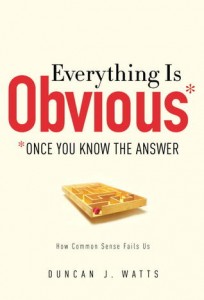 Book Review: Everything Is Obvious* Once You Know the Answer/Duncan J. Watts Book Review: Everything Is Obvious* Once You Know the Answer/Duncan J. Watts
Everything Is Obvious* is an excellent how-to guide to understanding how social networks change strategy, prediction and decision-making. It offers practical techniques and profound insights for using social networks, big data and new ways of thinking to solve complex problems in business and government.
Intriguingly, the book also cites research that debunks several social media sacred cows.
Watts has an interesting point of view because he combines several disciplines: he began his career as a physicist before moving into sociology, so he strives to combine the quantitative, experimental methods of physics with maddeningly complex social problems. Moreover, he’s been running practical experiments at Yahoo! for several years, using search, Web and social data. Watts backs up his assertions with primary research that he has led or in which he has participated. He is also a very engaging writer.
I also highly recommend “Obvious” because it enables […]
Situational Monopoly Is a 21st Century Profit Maker—Debunking Strategy Sacred Cows
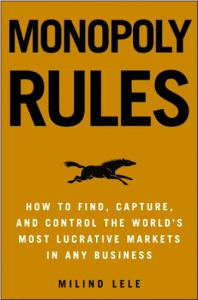 Since the 1990s, I have advised clients in many industries on using disruptive technology to change the rules, and one of the themes that has constantly recurred is companies’ decreasing ability to maintain high profits from product businesses. Products are not as profitable as they used to be. In the Industrial Economy, product life cycles were long because communication was infrequent and poor compared to today, which prolonged ignorance and novelty and product life cycles. It took years for fashions to cross the Atlantic, through the 1980s. Now fashions emerge simultaneously no matter where they originate. Today, novelty is consumed with alacrity, erasing differentiation and price premiums. Since the 1990s, I have advised clients in many industries on using disruptive technology to change the rules, and one of the themes that has constantly recurred is companies’ decreasing ability to maintain high profits from product businesses. Products are not as profitable as they used to be. In the Industrial Economy, product life cycles were long because communication was infrequent and poor compared to today, which prolonged ignorance and novelty and product life cycles. It took years for fashions to cross the Atlantic, through the 1980s. Now fashions emerge simultaneously no matter where they originate. Today, novelty is consumed with alacrity, erasing differentiation and price premiums.
To reference one statistic, in 2011 two billion people access the Internet, one third of the global population. They have access to infinite amounts of information and relationships. They share information about using products and services to create value in terms of their situations, and other people find them and interact. When people interact, they make each other smarter, fast. They expose product […]
Review: South by Southwest Interactive 2011 takes you behind the curtain of the famous confab and suggests why you might want to attend
 I had never attended SXSW before because I always had other things happening, and the value proposition was never obvious to me. In general, I attend very few “social media” conferences as the hype usually exceeds the delivery in an “industry” that’s particularly prone to self-congratulation. This year, a client launched a new venture at SXSW, so I decided to stay a couple of days afterward to see what the noise was about. Here are my informal impressions that I hope will be useful to you in deciding whether it might be worthwhile for you to attend. I invite your comments and impressions, too. I had never attended SXSW before because I always had other things happening, and the value proposition was never obvious to me. In general, I attend very few “social media” conferences as the hype usually exceeds the delivery in an “industry” that’s particularly prone to self-congratulation. This year, a client launched a new venture at SXSW, so I decided to stay a couple of days afterward to see what the noise was about. Here are my informal impressions that I hope will be useful to you in deciding whether it might be worthwhile for you to attend. I invite your comments and impressions, too.
[Update: links to additional coverage below: Gowalla, TOMS, LinkedIn execs]
[…]
Curmudgeonly Looking into the Past to Divine the Future—That Nagging Privacy Issue—Debunking the Elephant
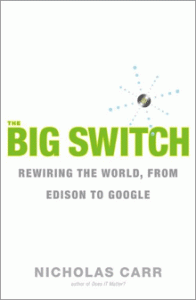 The Big Switch is a valuable book that reflects what has become Nick Carr’s trademark role, heckling IT and Web enthusiasts, albeit from good seats. Carr seems to relish his role as “the fly in the ointment” of the idealistic IT-enabled world that Web missionaries espouse. Although this book has shortcomings, I recommend it for two reasons. First, Carr makes a convincing and useful argument that the “electrification” of business and society (the Edison part) has valuable lessons for the “computerization” transformation of business and society (the Google part) that is currently unfolding. This parallel provides context to think about some of the disruptions around your business, society and career. Second, Carr raises serious questions about possible privacy implications of computerization. He palpably weighs in on the dark side and seems to want the world to change course from the “googlization of life.” If you haven’t read The Long Tail, I would read these books in proximity because they are very complementary and both quick, important reads. The Big Switch is a valuable book that reflects what has become Nick Carr’s trademark role, heckling IT and Web enthusiasts, albeit from good seats. Carr seems to relish his role as “the fly in the ointment” of the idealistic IT-enabled world that Web missionaries espouse. Although this book has shortcomings, I recommend it for two reasons. First, Carr makes a convincing and useful argument that the “electrification” of business and society (the Edison part) has valuable lessons for the “computerization” transformation of business and society (the Google part) that is currently unfolding. This parallel provides context to think about some of the disruptions around your business, society and career. Second, Carr raises serious questions about possible privacy implications of computerization. He palpably weighs in on the dark side and seems to want the world to change course from the “googlization of life.” If you haven’t read The Long Tail, I would read these books in proximity because they are very complementary and both quick, important reads.
As […]
|
|

 Triune Ethics is an enthralling, exceedingly useful approach to understanding human behavior because it explains the context of trust and relationship building at a profound level that is actionable for anyone who wants deeper, richer, more flexible connections and collaboration with people. Triune Ethics Theory will help me to educate my clients and teams at a deep level, and it can give you a rare understanding of your own behavior—and that of people around you.
Triune Ethics is an enthralling, exceedingly useful approach to understanding human behavior because it explains the context of trust and relationship building at a profound level that is actionable for anyone who wants deeper, richer, more flexible connections and collaboration with people. Triune Ethics Theory will help me to educate my clients and teams at a deep level, and it can give you a rare understanding of your own behavior—and that of people around you.
 The Potential of Female Leadership explores what lessons we may learn from bonobos’ matriarchal social structure, so we can build stronger, more collaborative human communities and groups. Bonobo Handshake is an enthralling insightful book, which I review here. A tremendous bonus is its similarities to and significant differences from Chimpanzee Politics (reviewed yesterday).
The Potential of Female Leadership explores what lessons we may learn from bonobos’ matriarchal social structure, so we can build stronger, more collaborative human communities and groups. Bonobo Handshake is an enthralling insightful book, which I review here. A tremendous bonus is its similarities to and significant differences from Chimpanzee Politics (reviewed yesterday). Unique, Insightful and Useful Guide to Business and Civil Politics reveals human political strategies through the eyes of a primatologist studying a chimpanzee community. It lays bare most of the behavior people use “to get ahead” in business and politics by explaining the evolutionary underpinnings of these behaviors, so we can appreciate them at a new level.
Unique, Insightful and Useful Guide to Business and Civil Politics reveals human political strategies through the eyes of a primatologist studying a chimpanzee community. It lays bare most of the behavior people use “to get ahead” in business and politics by explaining the evolutionary underpinnings of these behaviors, so we can appreciate them at a new level. Free is an indispensable introduction to the disruption of “a product for a price,” one of the Industrial Economy’s key constructs. It is rich with examples of many of the pricing innovations and business models with which you’re probably familiar but haven’t thought about in depth. Many of its examples have to do with digital products, which are inherently disruptive because their distribution cost is close to zero, and they can displace legacy analog products.
Free is an indispensable introduction to the disruption of “a product for a price,” one of the Industrial Economy’s key constructs. It is rich with examples of many of the pricing innovations and business models with which you’re probably familiar but haven’t thought about in depth. Many of its examples have to do with digital products, which are inherently disruptive because their distribution cost is close to zero, and they can displace legacy analog products. [UPDATED] Step inside a data scientist’s mind, and learn why probability is the key to profit and how it’s the key to understanding and using big data for better decision making. This fascinating and useful book clearly shows how people misunderstand probability and misuse statistics—and therefore big data—and how the knowledge gap leads to faulty models, thinking and decisions. New winners and losers are emerging in the digital social and big-data age. A new digital divide, people who think like data scientists and use probability to support decision making—and everyone else. The data science group will outperform, and Fung shows how creative, fun and useful data science is.
[UPDATED] Step inside a data scientist’s mind, and learn why probability is the key to profit and how it’s the key to understanding and using big data for better decision making. This fascinating and useful book clearly shows how people misunderstand probability and misuse statistics—and therefore big data—and how the knowledge gap leads to faulty models, thinking and decisions. New winners and losers are emerging in the digital social and big-data age. A new digital divide, people who think like data scientists and use probability to support decision making—and everyone else. The data science group will outperform, and Fung shows how creative, fun and useful data science is. Anonymity, Marketing and Predicting the Future shows that, although each culture has its own concepts of “anonymity” and “marketing,” anonymity will prove to have been a temporary phenomenon in most human cultures because communications technologies are counteracting it. Moreover, based on my studies of and experience with sociology, evolutionary psychology and technology, I observe that 20th century marketing is grounded in anonymity, so we can predict the future of marketing by exploring anonymity and its relationship to marketing.
Anonymity, Marketing and Predicting the Future shows that, although each culture has its own concepts of “anonymity” and “marketing,” anonymity will prove to have been a temporary phenomenon in most human cultures because communications technologies are counteracting it. Moreover, based on my studies of and experience with sociology, evolutionary psychology and technology, I observe that 20th century marketing is grounded in anonymity, so we can predict the future of marketing by exploring anonymity and its relationship to marketing. Book Review: Everything Is Obvious* Once You Know the Answer/Duncan J. Watts
Book Review: Everything Is Obvious* Once You Know the Answer/Duncan J. Watts  Since the 1990s, I have advised clients in many industries on using disruptive technology to change the rules, and one of the themes that has constantly recurred is companies’ decreasing ability to maintain high profits from product businesses. Products are not as profitable as they used to be. In the Industrial Economy, product life cycles were long because communication was infrequent and poor compared to today, which prolonged ignorance and novelty and product life cycles. It took years for fashions to cross the Atlantic, through the 1980s. Now fashions emerge simultaneously no matter where they originate. Today, novelty is consumed with alacrity, erasing differentiation and price premiums.
Since the 1990s, I have advised clients in many industries on using disruptive technology to change the rules, and one of the themes that has constantly recurred is companies’ decreasing ability to maintain high profits from product businesses. Products are not as profitable as they used to be. In the Industrial Economy, product life cycles were long because communication was infrequent and poor compared to today, which prolonged ignorance and novelty and product life cycles. It took years for fashions to cross the Atlantic, through the 1980s. Now fashions emerge simultaneously no matter where they originate. Today, novelty is consumed with alacrity, erasing differentiation and price premiums. I had never attended SXSW before because I always had other things happening, and the value proposition was never obvious to me. In general, I attend very few “social media” conferences as the hype usually exceeds the delivery in an “industry” that’s particularly prone to self-congratulation. This year, a client launched a new venture at SXSW, so I decided to stay a couple of days afterward to see what the noise was about. Here are my informal impressions that I hope will be useful to you in deciding whether it might be worthwhile for you to attend. I invite your comments and impressions, too.
I had never attended SXSW before because I always had other things happening, and the value proposition was never obvious to me. In general, I attend very few “social media” conferences as the hype usually exceeds the delivery in an “industry” that’s particularly prone to self-congratulation. This year, a client launched a new venture at SXSW, so I decided to stay a couple of days afterward to see what the noise was about. Here are my informal impressions that I hope will be useful to you in deciding whether it might be worthwhile for you to attend. I invite your comments and impressions, too. The Big Switch is a valuable book that reflects what has become Nick Carr’s trademark role, heckling IT and Web enthusiasts, albeit from good seats. Carr seems to relish his role as “the fly in the ointment” of the idealistic IT-enabled world that Web missionaries espouse. Although this book has shortcomings, I recommend it for two reasons. First, Carr makes a convincing and useful argument that the “electrification” of business and society (the Edison part) has valuable lessons for the “computerization” transformation of business and society (the Google part) that is currently unfolding. This parallel provides context to think about some of the disruptions around your business, society and career. Second, Carr raises serious questions about possible privacy implications of computerization. He palpably weighs in on the dark side and seems to want the world to change course from the “googlization of life.” If you haven’t read The Long Tail, I would read these books in proximity because they are very complementary and both quick, important reads.
The Big Switch is a valuable book that reflects what has become Nick Carr’s trademark role, heckling IT and Web enthusiasts, albeit from good seats. Carr seems to relish his role as “the fly in the ointment” of the idealistic IT-enabled world that Web missionaries espouse. Although this book has shortcomings, I recommend it for two reasons. First, Carr makes a convincing and useful argument that the “electrification” of business and society (the Edison part) has valuable lessons for the “computerization” transformation of business and society (the Google part) that is currently unfolding. This parallel provides context to think about some of the disruptions around your business, society and career. Second, Carr raises serious questions about possible privacy implications of computerization. He palpably weighs in on the dark side and seems to want the world to change course from the “googlization of life.” If you haven’t read The Long Tail, I would read these books in proximity because they are very complementary and both quick, important reads.